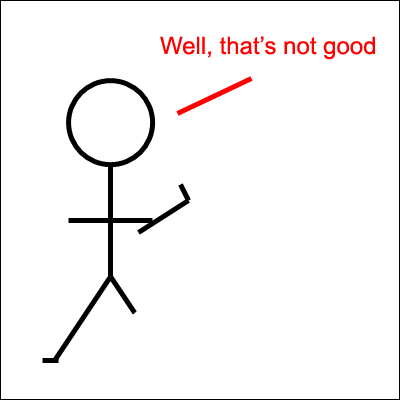Adjectives bring a noun to life. Adverbs do the same for
verbs.
Suppose that same police officer from earlier asked you to describe how
your assailant attacked you. It could have been:
Quickly, Slowly, Sneakily, Deliberately,
Methodically
A lot of adverbs are formed by talking an adjective and adding an 'ly'
to the end.
| Adjective |
Adverb |
| Quick |
Quickly |
| Slow |
Slowly |
| Sneak |
Sneakily |
| Deliberate |
Deliberately |
One adjective that often gets misused, especially
in TV and Movies, is 'quick':
"Come quick!"
If you're trying to say something about a verb like 'come' then you
need the adverb, which is 'quickly':
"Come quickly!"
Though if someone needs you urgently, they're probably not in the
mood to be corrected on the subtle differences between the adjective and
the adverb.
Good is an adjective. Well is in adverb. Adjectives say
something about the noun/pronoun, remember, and they usually go before the
noun or pronoun. Adverbs say something about the verb and usually come after
the verb. So:
The man done well
And not:
The man done good
Think of it like this:
The good man done well
Although, this is also correct:
"Did the man do bad work?"
"No, he did good."
But it's only correct because the noun's missing at the end.

This started out in Old English as ne-a-whit,
which translates as 'not ever thing' or 'nothing whatsoever'. Then it did
this:
ne-a-whit -> na-whit -> nawt -> not
In French, you express the negation with ne pas. Around the 10th century,
it used to be just ne without the pas. But that was thought to be not emphatic
enough. For example:
Do you want sprouts?
No (a timid no)
Absolutely not! (an emphatic no)
If you really hated Brussel sprouts in 10th century France, there was no
way to say 'Absolutely not!'. You could say 'not' but you'd probably end
up with the sprouts as you weren't being emphatic enough. Then the 'pas'
came in and - voila! no sprouts.
However, there were a few contenders to the throne of pas. Instead of ne
pas you could say:
| French |
English |
| ne point |
No dot |
| ne gote |
Not a drop |
| ne amende |
Not an almond |
| ne areste |
Not a fish bone |
| ne eschalope |
Not a pea pod |
| ne mie |
Not a crumb |
Instead, they went with ne pas - not a step, as in 'not a step further
with those Brussel sprouts'.

